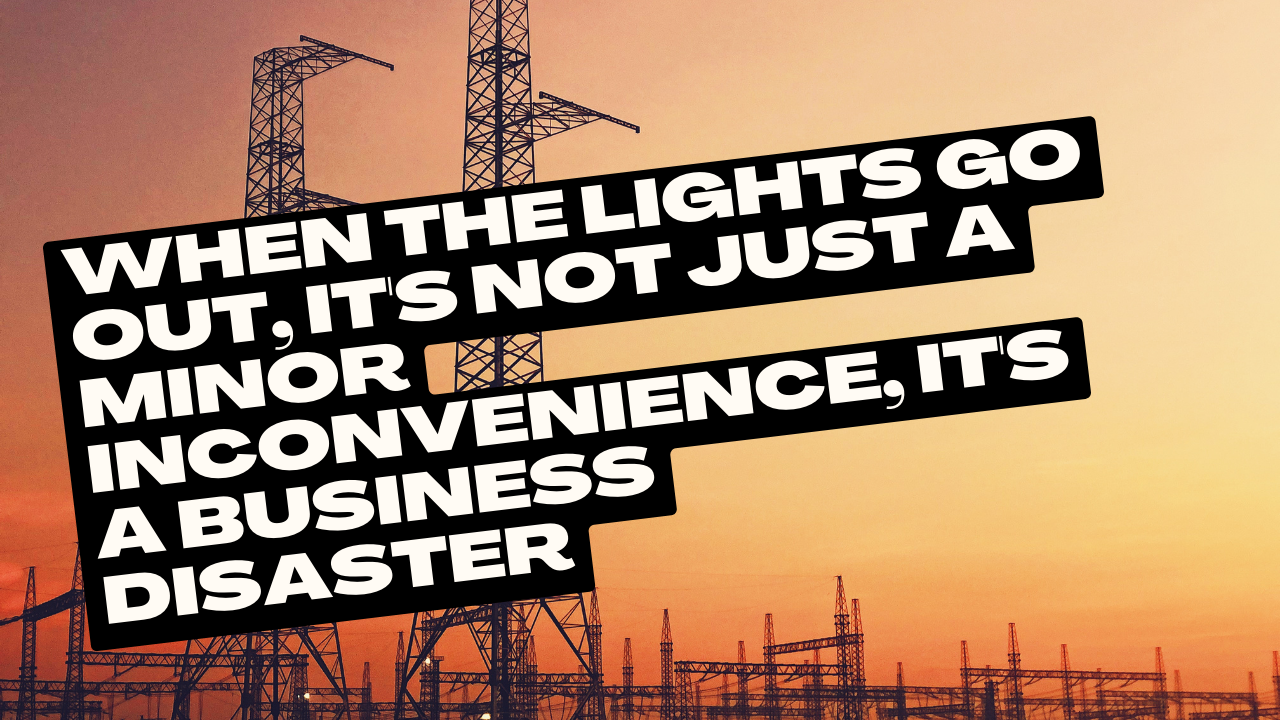
Power outages can bring businesses to a grinding halt, costing companies thousands or even millions in lost revenue and productivity. For many companies, especially those reliant on computers and machinery, even a minor disruption can be catastrophic.
This article will examine the major impacts of power outages on businesses and why having backup power through generator rental is critical for any operation.
The Costs of Downtime
When the lights go out and machines power down, production stops. Employees sit idle without computer access or operational equipment. Perishable materials and products can spoil. For many businesses, every minute offline equates directly to lost income.
Even brief outages of just minutes can result in substantial revenue losses depending on the industry.
Manufacturers and industrial facilities often estimate downtime costs at thousands per minute. A study found the average cost per minute of downtime across various industries ranged from $5,600 to $11,000. For a large manufacturer, even one hour offline could mean hundreds of thousands in lost productivity and up to a week to fully recover.
Smaller businesses face proportionate impacts based on their size and reliance on electricity and computing.
Beyond immediate lost operating revenue, downtime disrupts supply chains and delivery schedules which can impact customer retention and satisfaction long-term. Outages also frequently cause data loss and corruption which can permanently destroy essential information.
For facilities like data centers and call centers, downtime is especially catastrophic and can permanently damage their business.
Major Causes of Outages
According to BlackoutTracker which tracks US power outage data, the leading causes of disruptions are:
- Severe weather such as storms, tornadoes, floods, lightning, and wind which damage power infrastructure
- Vehicle and digging accidents that sever underground lines
- Equipment failure from age, defects, or overloads
- Rodents, birds, or vegetation contacting equipment
- Fire, construction, and vandalism
As climate change increases extreme weather events, outages from storms now account for over 50% of all disruptions. Many parts of the US now experience increased frequency and duration of outages compared to historical baselines. For businesses, planning for power continuity is more critical than ever.
Impacts on Specific Industries
While all businesses rely on electricity to some degree, some sectors are disproportionately vulnerable to any disruption:
Manufacturing – Any downtime means halted production which directly reduces output and revenue. Complex machinery and sensitive materials also risk damage.
Data Centers – Outages can cause catastrophic data loss and permanent infrastructure damage. Most data center tenants have strict legal uptime guarantees as part of their contracts.
Cold Storage/Food Production – Inventory loss from spoilage and temperature swings during electrical failures can devastate refrigerated warehouses and food processors.
Hospitals – Patient care, lifesaving equipment, and essential records all require continuous reliable power. Outages risk lives and compromise care quality.
Call Centers – Without computers and phones, agents cannot reach customers leading to substantial missed revenues.
Banks – Transactions, records, security systems, and cash access rely on electricity. Outages disrupt business operations and reduce consumer confidence.
As this small sampling shows, modern enterprises simply cannot afford to be without power for any significant length of time without exposing themselves to potentially company ending risks.
Generator Rentals Offer Critical Backup Protection
To avoid the devastating financial impact of utility disruptions, businesses should invest in temporary power solutions from specialized rental providers. Generator and battery rentals can supply emergency power within hours to restore business operations.
Rental assets are professionally maintained and housed offsite until dispatched, unlike owning a backup unit outright.
Leading rental companies like JC Davis Power offer 24/7 emergency response, flexible rental terms, right-sized equipment, and turnkey operation so that power gets restored instantly without customers needing to manage anything themselves. Rental generators range from small portable units for running critical loads to massive multi-megawatt stations for keeping entire facilities online.
Rental providers also assist with utility compliance, emissions permitting, and load planning to ensure temporary assets integrate safely and effectively. They handle all transportation, connections, and fueling as well so that power gets flowing immediately.
With generator and battery rentals, businesses can rest assured that even if the lights go out, their operations will stay up and running through the outage.
Reliable backup power no longer needs to be a major capital investment either. Short-term rentals for planned outages or maintenance work cost a fraction of owning equipment permanently. Businesses only pay for the capacity and runtime they actually need versus buying assets outright that mostly sit idle. Utilizing rentals as needed is often the most flexible and cost-effective way to manage continuity risks for any operation.
Take Action Today
Don’t wait until an outage suddenly appears on the forecast to start planning for emergency power. With increasing extreme weather, accidents, and aging infrastructure causing more disruptions, having backup rentals pre-arranged ensures businesses stay resilient no matter what happens.
Contact specialized providers like JC Davis Power ahead of time to discuss rental solutions tailored to the requirements and risks of your operation. The devastating domino impact from downtime will only intensify as utilities become less reliable.
With the right temporary power partner, companies can keep the lights on and avoid becoming another statistic. Stay open and operating through the storm by arranging emergency rentals now before disaster strikes.





